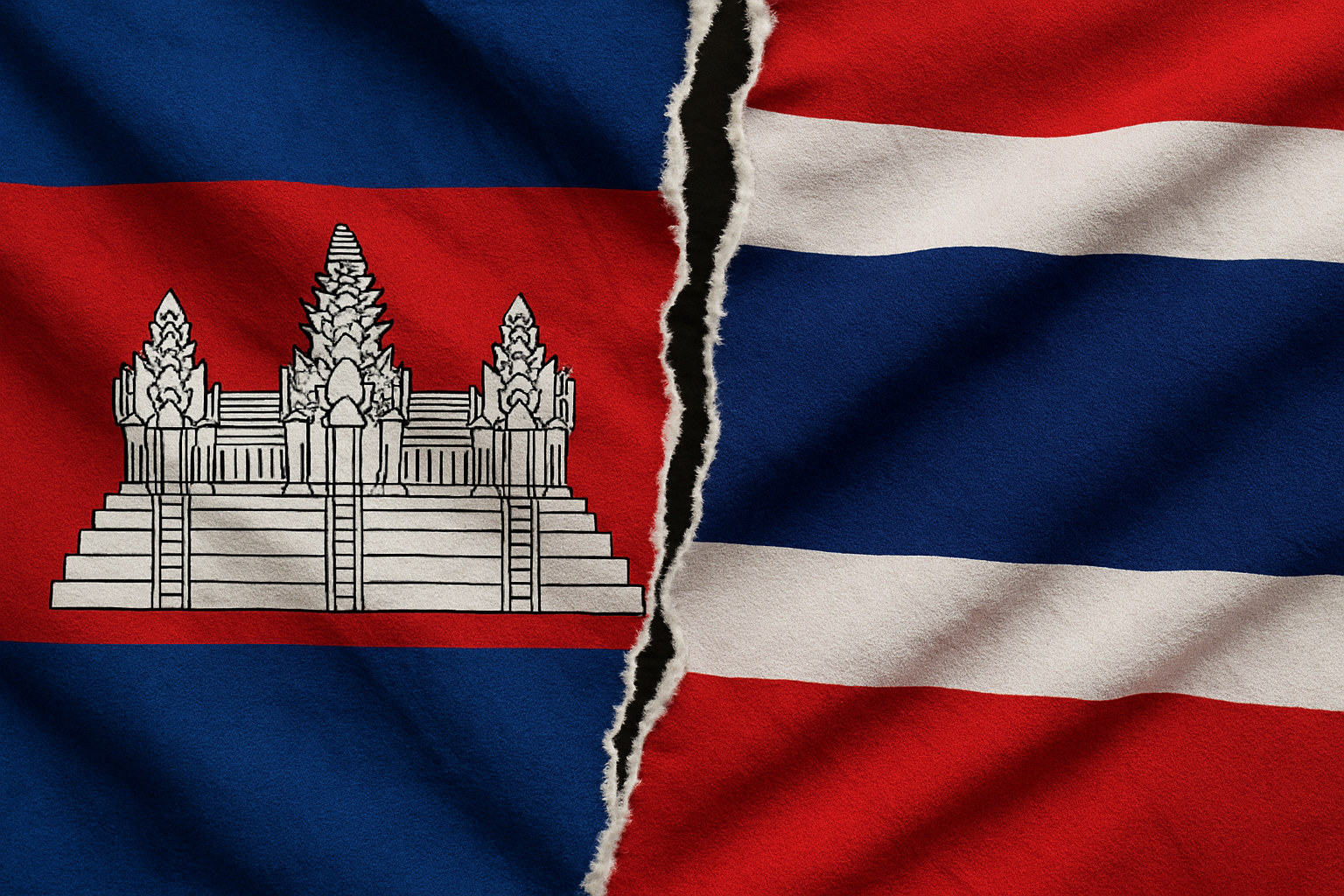Thailand-Cambodia Border Conflict: Tensions Flare in 2025
On July 24, 2025, the long-simmering border dispute between Thailand and Cambodia erupted into violent clashes near the Ta Moan Thom Temple, located in Thailand’s Surin province and Cambodia’s Oddar Meanchey province.

⚡ A Renewed Flashpoint at Ta Moan Thom
This latest escalation, marked by gunfire, shelling, and rocket fire, has claimed at least 11 Thai civilians and one soldier, with 14 others injured across three provinces: Surin, Sisaket, and Ubon Ratchathani. A devastating Cambodian rocket strike on a Sisaket gas station killed six, including an eight-year-old child. Cambodia has not disclosed its casualties but accuses Thai forces of initiating the conflict by advancing on the temple, while Thailand claims Cambodian troops, equipped with drones and BM-21 rocket launchers, fired first. Thailand’s response included airstrikes, deploying six F-16 jets to target Cambodian military positions, reportedly destroying two targets.
😠 Roots of the Conflict
The current violence is rooted in a century-old dispute over border demarcations, originating from a 1907 map drawn during French colonial rule, which Thailand has long contested. The Ta Moan Thom Temple, like the nearby Preah Vihear Temple (awarded to Cambodia by the International Court of Justice in 1962), remains a flashpoint due to its cultural and historical significance. Tensions flared earlier this year, with a Cambodian soldier killed in a May 28, 2025, skirmish in the Emerald Triangle—a disputed region involving Cambodia, Thailand, and Laos. Cambodia accused Thai forces of attacking a long-standing military post, while Thailand claimed self-defense. A February 2025 incident, where Cambodian soldiers escorted civilians to the temple, leading to a confrontation over national anthem singing, further stoked nationalist sentiments. Recent landmine injuries to Thai soldiers, which Thailand attributes to Cambodia, added fuel to the fire.
🏛️ Diplomatic Breakdown
The conflict has severely strained bilateral relations. Thailand closed its 17 border checkpoints with Cambodia, recalled its ambassador, and expelled Cambodia’s, prompting Cambodia to retaliate with cross-border embargoes and a ban on Thai media. A leaked June 15, 2025, phone call between Thai Prime Minister Paetongtarn Shinawatra and Cambodia’s Senate President Hun Sen, in which Paetongtarn called Hun Sen “uncle” and referred to the Thai military as “the opposite side,” sparked outrage in Thailand. This led to her suspension by Thailand’s Constitutional Court on July 1, 2025, weakening her government and intensifying nationalist backlash. Cambodia’s appeal to the ICJ in June 2025 to resolve disputes over four border areas, citing the 1962 Preah Vihear ruling, was met with Thailand’s rejection of ICJ jurisdiction, favoring bilateral talks through the Joint Boundary Commission (JBC).
🌏 Regional and Global Implications
ASEAN, which includes both nations, has been urged to mediate, but its effectiveness is limited by internal divisions and focus on other regional crises, like Myanmar’s civil war. China, a key Cambodian ally, called for dialogue, while the U.S. urged de-escalation through diplomacy. The conflict reflects broader geopolitical dynamics, with Cambodia’s ties to China and Thailand’s U.S. alignment shaping their approaches. Cambodia’s announcement of military conscription starting in 2026, citing Thai aggression, and Thailand’s military buildup signal a risk of further escalation.
🤔 My Take
The recent flare-up between Thailand and Cambodia near the Ta Moan Thom Temple on July 24, 2025, is a messy situation with no clear answer on who fired the first shot. Thailand insists Cambodian forces, armed with drones and BM-21 rocket launchers, attacked first, while Cambodia claims Thai soldiers sparked the clash by advancing on the temple in violation of agreements. Without independent verification from bodies like ASEAN or the UN, it’s a fog of accusations driven by nationalist fervor on both sides. But let’s cut through the haze: Thailand, a long-standing U.S. ally, deserves our support. Cambodia’s cozy relationship with China raises questions about Beijing’s influence—did President Xi Jinping quietly encourage this escalation to flex regional muscle or distract from domestic issues? It’s plausible, given China’s history of backing Cambodia to counterbalance U.S.-aligned nations like Thailand. Supporting Thailand aligns with U.S. strategic interests, ensuring stability in Southeast Asia and checking China’s growing influence in the region.
On the global stage, some might speculate this conflict ties into a bizarre Nobel Peace Prize rivalry, with figures like Trump basking in diplomatic limelight elsewhere. I’m skeptical this is a “piss match” for awards—border disputes like this are rooted in decades of historical grudges, not trophy-chasing. Still, the U.S. must prioritize Thailand, not just for geopolitical balance but to uphold a rules-based order against Cambodia’s provocations, which may be emboldened by Chinese support. Thailand’s rejection of ICJ jurisdiction and push for bilateral talks signal a desire for sovereignty, which resonates with U.S. values of self-determination. We should back Thailand with diplomatic and, if needed, military support to deter further aggression and ensure this conflict doesn’t spiral into a broader regional crisis.
🗒️ Final Notes
As of July 24, 2025, fighting has spread to six border areas, with Thailand evacuating 40,000 civilians and Cambodia preparing for further conflict while urging calm. Both sides have expressed a desire to avoid full-scale war, with Thailand’s acting Prime Minister Phumtham Wechayachai emphasizing ongoing negotiations. However, entrenched nationalist sentiments, unclear border demarcations, and domestic political pressures—Hun Sen’s influence in Cambodia and Thailand’s fragile coalition government—complicate de-escalation. The dispute’s historical weight, combined with recent violence, suggests the situation may worsen before it improves.
For those following this issue, keep an eye on Cambodia’s ICJ filings and Thailand’s JBC proposals, though Thailand’s resistance to international arbitration may hinder multilateral solutions.
👋 Follow Me!
If you enjoy my content, please follow me on Social Media and consider sharing this content with your friends! I hope you have a great day! - Karl Bullock "That Smoke Pit Veteran"
X / Threads / Facebook / Instagram
Enjoyed the content? Help keep That Smoke Pit Veteran alive with a kind donation! Your support means the world.
Email: [email protected]

